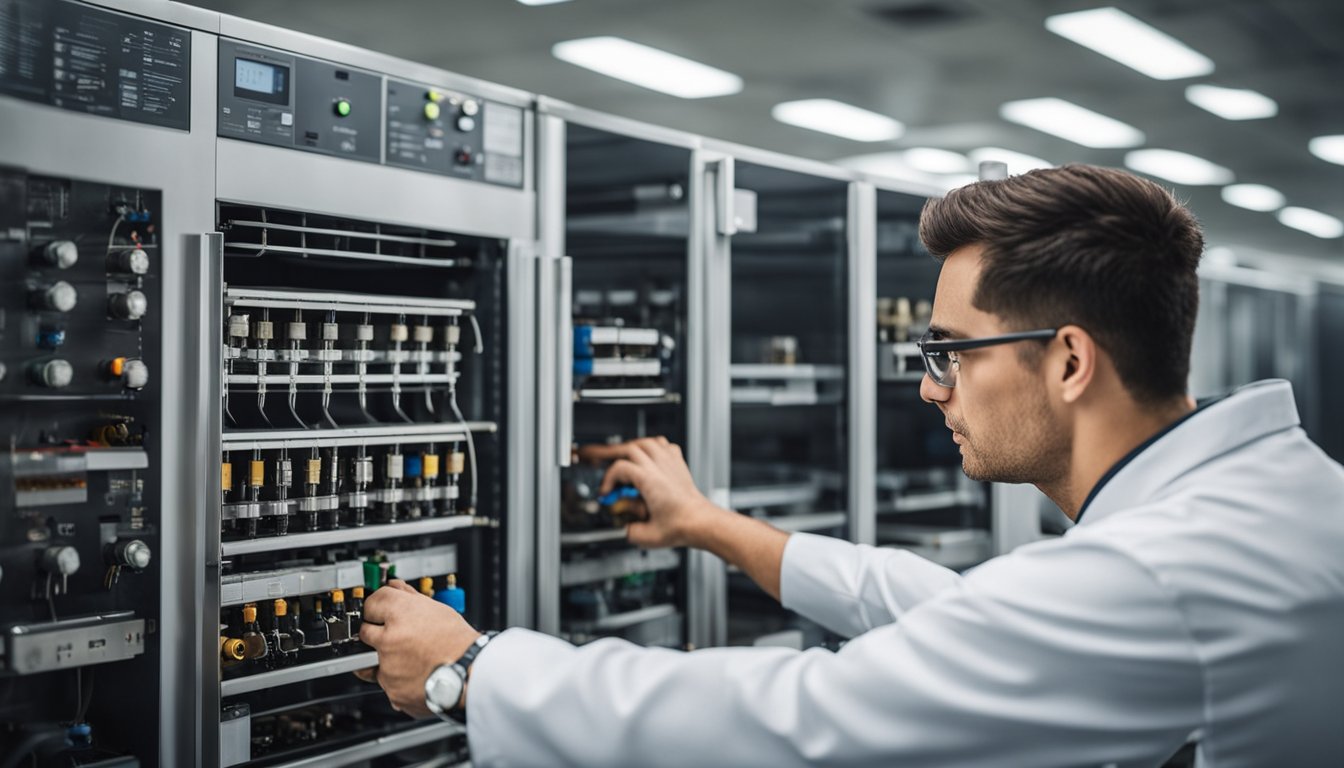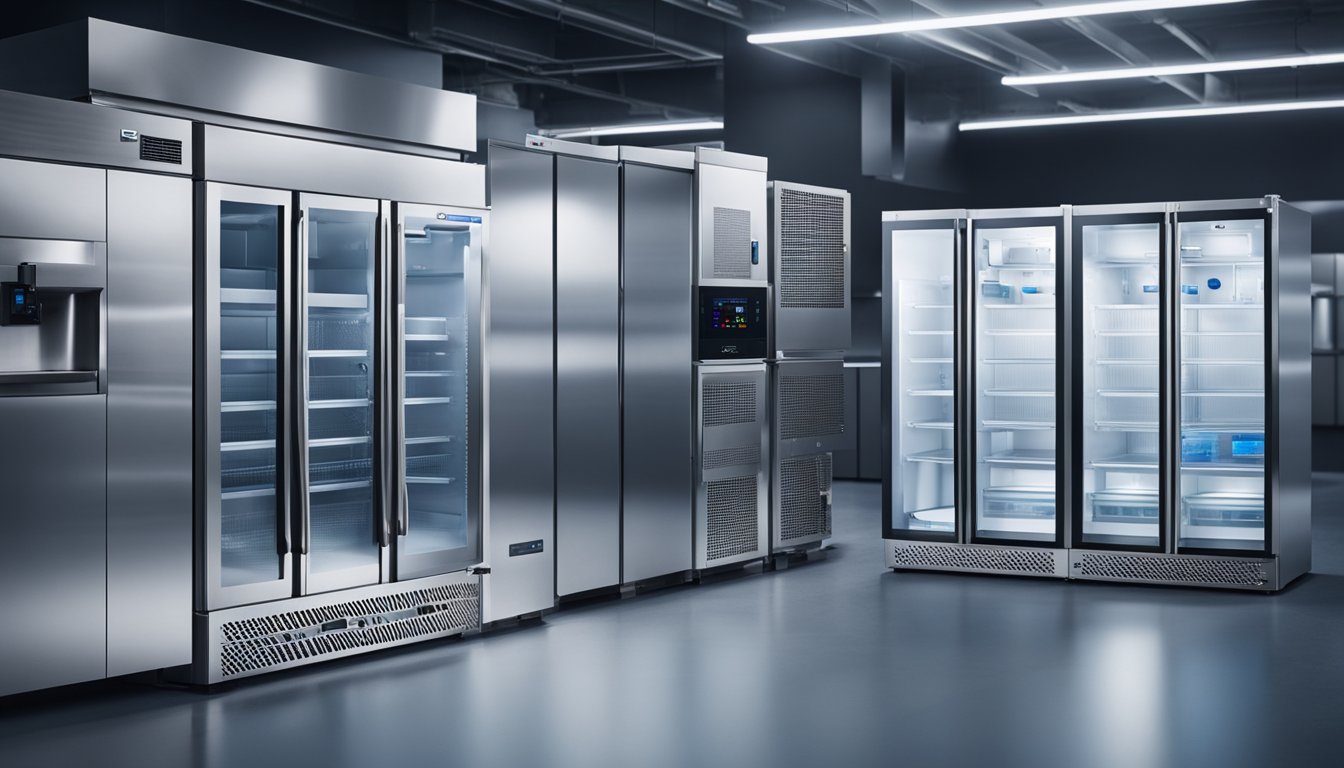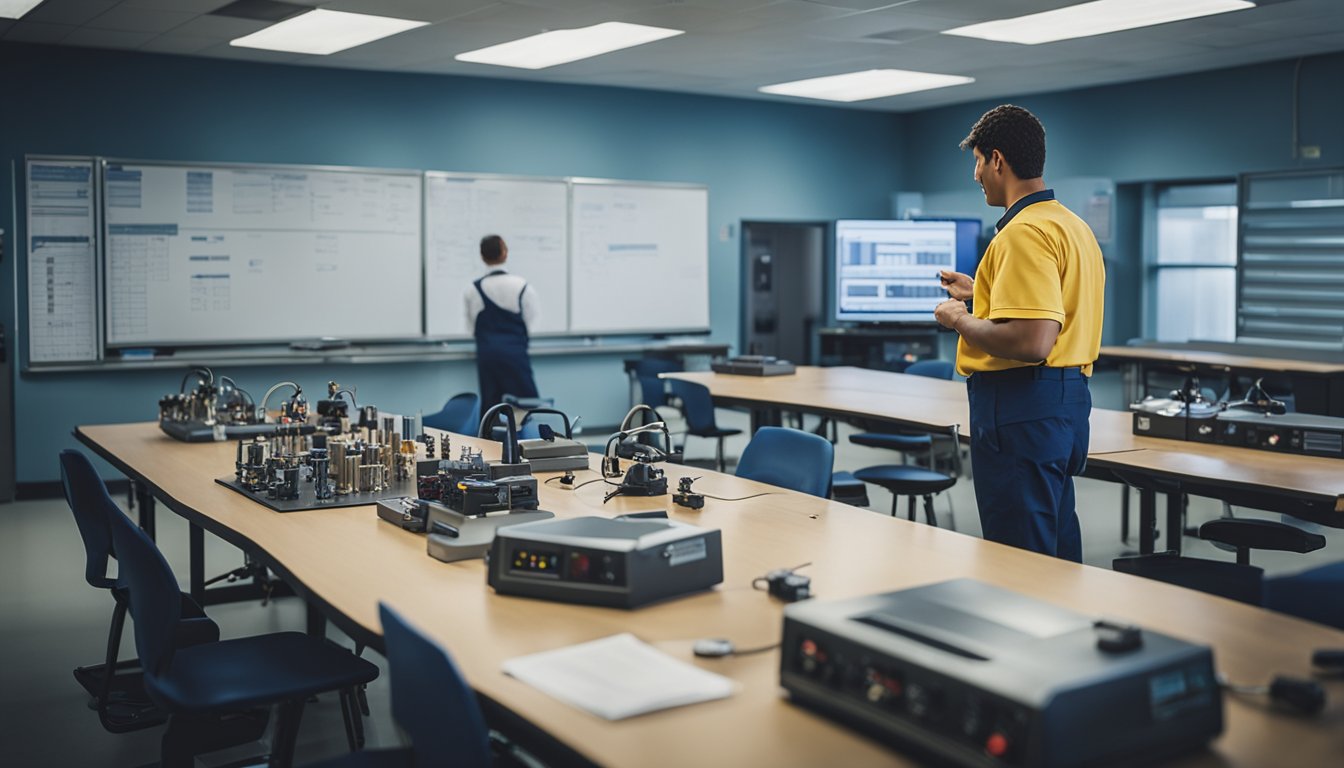Refrigeration Courses: Essential Skills for HVAC Technicians
Refrigeration training is a vital step for anyone looking to start or advance their career in the HVACR industry. You can gain essential skills and knowledge about commercial refrigeration systems through specialized courses and programs. These programs cover topics like system design, maintenance, and troubleshooting.

As an HVACR technician, you’ll work with a variety of refrigeration equipment used in stores, restaurants, and warehouses. Training programs often include hands-on practice with real systems, helping you build practical skills. You’ll learn about different types of compressors, evaporators, and condensers.
Many online refrigeration training courses are available, allowing you to learn at your own pace. These courses typically start with refrigeration fundamentals before moving on to more advanced topics. Some programs also offer certifications that can boost your career prospects in this growing field.
Refrigeration Systems and Components
Refrigeration systems are complex machines that require a deep understanding of their cycles, types, and components. Proper knowledge of these elements is crucial for effective operation and maintenance.
Understanding Refrigeration Cycles
The refrigeration cycle is the heart of any cooling system. It involves four main stages: evaporation, compression, condensation, and expansion.
In the evaporation stage, the refrigerant absorbs heat from the surrounding area. The compressor then pressurizes the refrigerant vapor. During condensation, the hot, high-pressure vapor releases heat and turns into a liquid. Finally, the expansion valve reduces the pressure of the liquid refrigerant.
This cycle repeats continuously, moving heat from inside the refrigerated space to the outside. Understanding this process is key to troubleshooting and maintaining refrigeration systems.
Types of Refrigeration Systems
There are several types of refrigeration systems, each suited for different applications. The most common are:
- Direct expansion systems
- Indirect systems
- Cascade systems
- Absorption systems
Direct expansion systems are widely used in commercial settings. They’re efficient and cost-effective for smaller applications. Indirect systems use a secondary coolant, providing better temperature control in large spaces.
Cascade systems are ideal for achieving very low temperatures. They use two refrigeration cycles in series. Absorption systems, powered by heat instead of electricity, are useful in areas with unreliable power supplies.
Components and Controls
Refrigeration systems consist of several key components:
- Compressor: The heart of the system, pumping refrigerant through the cycle
- Condenser: Where heat is released from the refrigerant
- Evaporator: Where the refrigerant absorbs heat from the surroundings
- Expansion device: Controls refrigerant flow and pressure
Controls are crucial for system efficiency and safety. These include:
- Thermostats: Monitor and control temperature
- Pressure switches: Protect the system from dangerous pressure levels
- Defrost controls: Prevent ice buildup on the evaporator
Proper training in these components is essential for refrigeration technicians. It enables them to diagnose issues quickly and maintain system performance effectively.
Training Programs and Professional Development
Refrigeration professionals have various paths for skill development and career advancement. Training options range from formal certifications to hands-on apprenticeships and online courses.
Certification and Apprenticeships
Gaining industry-recognized certifications is crucial for refrigeration technicians. Many employers require North American Technician Excellence certification as a baseline qualification. This credential validates your skills and knowledge in specific areas of refrigeration.
Apprenticeship programs offer a blend of classroom learning and on-the-job training. These typically last 3-5 years and provide a solid foundation in refrigeration principles and practices. During an apprenticeship, you’ll work alongside experienced technicians, gaining practical skills.
Some key benefits of apprenticeships include:
- Earning while learning
- Hands-on experience with real equipment
- Networking opportunities in the industry
Online Training and eLearning
Digital learning platforms have revolutionized refrigeration training. Online courses offer flexibility and convenience, allowing you to learn at your own pace. Many programs include interactive modules, video demonstrations, and virtual simulations of refrigeration systems.
E-learning benefits for refrigeration technicians:
- 24/7 access to course materials
- Self-paced study options
- Reduced travel and accommodation costs
End-of-module assessments help reinforce your understanding. Upon completion, you can often earn printable certificates to showcase your new skills to employers.
Continued Education and Workshops
Staying current with industry trends and technologies is vital in refrigeration. Continuing education courses keep your skills sharp and up-to-date. Many organizations offer workshops focusing on specific topics like new refrigerants or energy efficiency techniques.
Attending industry conferences can also boost your knowledge. These events often feature:
- Hands-on product demonstrations
- Networking sessions with peers and experts
- Seminars on emerging technologies
Regular participation in continued education helps maintain your certifications and enhances your career prospects. Many employers value technicians who actively pursue ongoing learning opportunities.
Modern Refrigeration Technology and Innovations

Refrigeration technology has advanced rapidly in recent years. New systems offer better performance, efficiency, and control. Let’s explore some key developments shaping the future of cooling.
Advancements in Refrigeration Technology
CO2 refrigeration systems are gaining popularity due to their low environmental impact. These systems operate at high pressures, allowing for excellent cooling capacity and energy efficiency.
Magnetic refrigeration is an emerging technology that uses magnetic fields to cool objects. It eliminates the need for traditional refrigerants, potentially reducing energy use by up to 30%.
Variable speed compressors adjust their output based on cooling demand. This improves system efficiency and extends equipment life. Recent models can operate at speeds as low as 15% of their maximum capacity.
Smart Controls and Automation
Modern refrigeration systems use advanced controls and sensors for optimal performance. Smart thermostats learn usage patterns and adjust settings automatically.
Remote monitoring allows you to track system performance from anywhere. You can receive alerts about issues before they become major problems.
Predictive maintenance uses data analysis to anticipate when parts need replacement. This reduces downtime and extends equipment life. Some systems can predict failures up to 30 days in advance.
Sustainable Refrigerants and Practices
New refrigerants have been developed with lower global warming potential. These include hydrofluoroolefins (HFOs) and natural refrigerants like propane and ammonia.
Heat recovery systems capture waste heat from refrigeration processes. This energy can be used for space heating or hot water production, improving overall efficiency.
Advanced insulation materials, like vacuum insulated panels, reduce heat transfer. These can improve energy efficiency by up to 25% compared to traditional insulation.
Troubleshooting and System Optimization

Effective troubleshooting and optimization are key skills for refrigeration professionals. These abilities help minimize downtime, extend equipment lifespan, and ensure peak performance.
Diagnostic Techniques and Problem-Solving
When faced with system issues, start by checking for obvious problems like loose connections or dirty coils. Use your senses to detect unusual noises, vibrations, or odors.
For more complex issues, employ systematic fault-finding methods. Check refrigerant levels, pressures, and temperatures. Use specialized tools like leak detectors and multimeters to pinpoint problems.
Keep detailed records of your diagnostic process. This helps track recurring issues and improves future troubleshooting efficiency.
Simulation training can enhance your problem-solving skills without risking real equipment.
Preserving System Efficiency
Regular maintenance is crucial for keeping refrigeration systems running efficiently. Clean condenser and evaporator coils regularly to ensure proper heat transfer.
Check and adjust refrigerant charge as needed. Overcharging or undercharging can significantly impact system performance.
Inspect and tighten electrical connections to prevent voltage drop and component failure.
Monitor compressor operation closely. Look for signs of wear or inefficiency, such as increased power consumption or unusual noise.
Optimize system performance by adjusting settings based on current load and ambient conditions.
Maintenance Strategies for Longevity
Develop a comprehensive maintenance schedule. Include daily, weekly, monthly, and annual tasks to cover all aspects of system care.
Train operators in basic maintenance procedures. This helps catch minor issues before they become major problems.
Replace worn components promptly. Waiting too long can lead to cascading failures and increased repair costs.
Keep a stock of common replacement parts on hand to reduce downtime during repairs.
Consider using predictive maintenance techniques like vibration analysis or oil analysis to detect potential failures before they occur.
Ongoing training helps you stay current with the latest maintenance strategies and technologies.
Building a Career in Refrigeration

A career in refrigeration offers many paths for growth and success. You can find opportunities in various sectors, from commercial to industrial settings. The key is to develop your skills, build a strong resume, and connect with industry professionals.
Navigating HVACR Careers
The HVACR industry has a wide range of job roles. You might start as a refrigeration technician and move up to specialist positions. Some career options include:
- Residential refrigeration repair
- Commercial refrigeration installation
- Industrial cooling system maintenance
- HVACR system design
Salaries in this field can be competitive. Entry-level technicians often earn around $35,000 per year. With experience, you could make over $70,000 annually.
To advance, focus on continuous learning. Stay updated with new technologies and regulations. Consider getting certifications from groups like RSES. These can boost your career prospects and earning potential.
Crafting a Professional Resume
Your resume is crucial for landing jobs in refrigeration. Here’s how to make it stand out:
- Highlight technical skills
- List relevant certifications
- Include specific project examples
- Quantify your achievements
Use action words to describe your experience. For example, “Installed 50 commercial refrigeration units” is more impactful than “Responsible for installations.”
Don’t forget to tailor your resume for each job application. Match your skills to the job requirements. This shows employers you’re a good fit for the role.
Networking and Industry Involvement
Building connections is vital in the HVACR industry. Here are ways to expand your network:
- Attend trade shows and conferences
- Join professional associations
- Participate in online forums and discussions
- Follow industry blogs and journals
Networking can lead to job opportunities and partnerships. It’s also a great way to learn from HVACR experts. You can gain insights into new trends and best practices.
Consider contributing to industry publications. Writing articles or sharing case studies can boost your reputation. It positions you as a knowledgeable professional in the field.
Frequently Asked Questions

Refrigeration technicians need specific qualifications, skills, and certifications to succeed in the field. Training programs vary in length and format, with both in-person and online options available.
What qualifications are needed to become a certified refrigeration technician?
To become a certified refrigeration technician, you typically need a high school diploma or GED. You must also complete specialized training programs in refrigeration systems and HVAC technology.
Some states require licensing, which often involves passing an exam. Practical experience through apprenticeships or internships is valuable too.
How long does it typically take to complete a refrigeration training program?
Refrigeration training programs can take anywhere from 6 months to 2 years to complete. The duration depends on the type of program and whether you’re studying full-time or part-time.
Certificate programs are usually shorter, while associate degree programs take about 2 years. Apprenticeships may last 3-5 years, combining on-the-job training with classroom instruction.
Are there any accredited online refrigeration courses available for certification?
Yes, there are accredited online refrigeration courses available for certification. These programs offer flexibility for students who can’t attend in-person classes.
Online courses cover the same material as traditional programs, including refrigeration theory, system design, and safety protocols. Make sure to choose a program accredited by recognized industry organizations.
What are the essential skills required for a career in commercial refrigeration?
Essential skills for a career in commercial refrigeration include technical knowledge, problem-solving abilities, and attention to detail. You need to understand refrigeration systems and be able to diagnose and repair issues quickly.
Good math and physics skills are important. You should also be comfortable working with tools and reading technical diagrams.
What certifications are necessary to work in the refrigeration and HVAC industry?
Several certifications are necessary to work in the refrigeration and HVAC industry. The EPA Section 608 certification is required for handling refrigerants.
Other valuable certifications include those from NATE (North American Technician Excellence) and HVAC Excellence. These certifications demonstrate your expertise and can lead to better job opportunities.
Can you get refrigeration training online for free, and if so, what are the options?
While complete refrigeration training programs typically require payment, you can find some free online resources to start learning. YouTube videos and industry blogs offer basic information on refrigeration principles.
Some equipment manufacturers provide free online courses about their products. Keep in mind that free resources alone won’t lead to certification or replace hands-on training.


